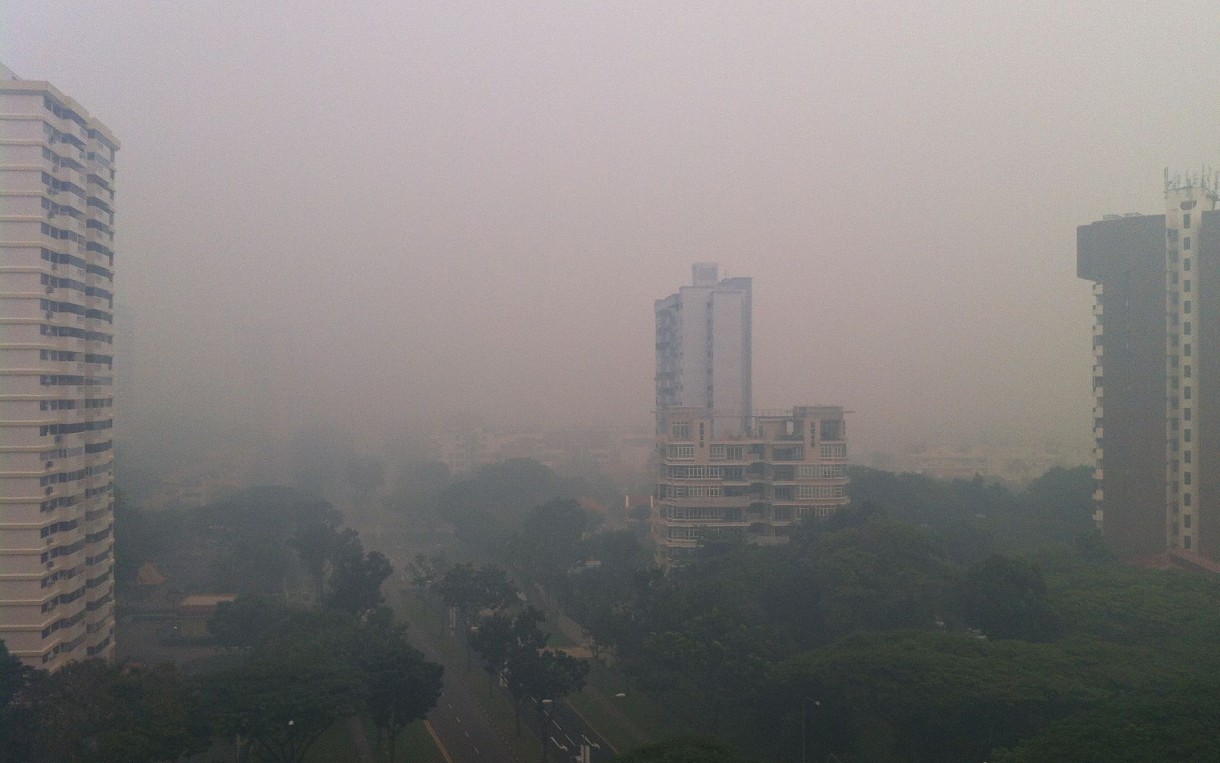Indonesian smoke signals: Three ways companies can curb deforestation in their supply chains
 The Marine Parade in Singapore shrouded by haze during the 2013 Southeast Asia haze caused by large scale burning in Indonesia. Source: Wolcott/ http://bit.ly/1WR7S3e
The Marine Parade in Singapore shrouded by haze during the 2013 Southeast Asia haze caused by large scale burning in Indonesia. Source: Wolcott/ http://bit.ly/1WR7S3e
The recent forest fires in Indonesia are a harsh reminder of all that still needs to be done to make companies’ zero deforestation commitments a reality.
Aditi Sen is a Policy Advisor on Climate Change for Oxfam America.
Last week I was in Singapore along with consumer goods companies, traders, and green groups to discuss how businesses can tackle commodity driven deforestation. Ironically, a thick haze caused by forest fires in neighboring Indonesia was choking the city. The haze, which was a result of fires being set to clear forest land for agriculture, mostly palm-oil and pulp and paper, could be among the worst in history according to some.
While a growing number of companies, including all the Behind the Brands companies barring Associated British Foods (ABF) have committed to deforestation-free supply chains, the haze was a reminder that these commitments have yet to be translated into reality. The rapid expansion of palm oil, pulp and paper into Indonesian forests and peat lands has made Indonesia one of the largest emitters of greenhouse gases. And the rampant destruction of forests doesn’t just impact the Orangutans; it also has profound social consequences as more than a quarter of Indonesia’s population depends on forests directly or indirectly.
So what will it take for companies to ensure that the supply chains of some of our favorite guilty pleasures like chocolates and chips are genuinely deforestation free?
- Traceability – Palm oil comes from a complex maze of traders, millers and growers. In order for large companies to ensure deforestation-free supply chains, they would need to guarantee that all of their suppliers, wherever they are, are not causing deforestation and have systems to trace materials back to the plantation to verify it. So far, only four Behind the Brand companies – Danone, Kellogg, Nestle and PepsiCo – have policies that commit to achieving traceability down to the plantation-level.
- Small-scale farmers need to be in the mix – Considering that smallholders hold close to 40% of the land planted with oil palm, they need to be part of the sustainability journey. But the fact that their yields are very low creates further pressure to deforest for more farm land.Reversing this perverse incentive would require investments to allow smallholders to boost productivity while maximizing the efficiency of existing plots, and ensuring fair prices and contracts.
- A clear standard for identifying which forests need to be conserved – A cornerstone of the zero deforestation commitment has been the commitment to conserve forests with High Carbon Stocks (HCS). However, right now, there is a debate brewing over how these forests are identified. The Roundtable of Sustainable Palm Oil (RSPO), which hasn’t really had standards for the protection of HCS areas, now has an opportunity to step up its game by taking the best elements from the different HCS methodologies to develop a comprehensive land use planning framework that provides clear guidance on which forest lands should be developed and which should be conserved. Such a framework should take into account the multiple environmental and social values forest ecosystems provide whilst ensuring that rights and livelihoods of smallholders and local communities are safeguarded.
While the implementation of zero deforestation commitments remains challenging, I also felt somewhat cautiously optimistic on seeing the breadth of transformation across the palm oil supply chain. Today not only have major consumer goods companies committed to sourcing deforestation free palm oil, powerful traders like ADM, Bunge, Cargill and Wilmar have also made similar commitments. A particularly encouraging sign for me was that leading palm oil producers were present at the discussions in Singapore, and are in many ways leading the charge on implementation. These producers along with the Indonesian Chamber of Commerce and Industry have signed a landmark agreement – the Indonesia Palm Oil Pledge – that not only commits them to strong sustainability practices within their own companies but also includes proactive government engagement on policy reform.
But there’s still a lot of work to be done on the ground – it’s time now to clear the haze.